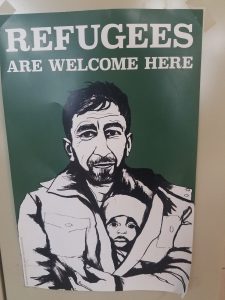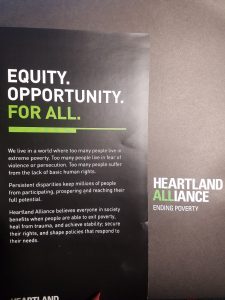In my last blog, I was feeling a lot of stress. I was struggling with one of my biggest weaknesses: anxiety. Although my internship always keeps me on my toes, I eventually got into the rhythm of things. Psychologically, I think it helped that there were interns that started after me who I guided. For example, I taught them about different trips and what documents to bring (such documents to apply for a social security card). I gained confidence because that proved to me that I was retaining reliable knowledge while at RICS. As gained more confidence in my actions, I was able to relax more, better reflect on my experiences, and enjoy my time with the participants* and my coworkers.
When I was first here, I thought about whether or not moving to the US was worth it for some of the participants. It seemed so dismal at the time, coming to a new place where you don’t know the language or culture. I was blessed when I went abroad that I had such a big support system, composed of people who were not only familiar with the culture but loved and cared for me, wishing the best for me. And I had them with me every day, available for whenever I needed them. Yet, I still struggled. To come here and not have that kind of support seemed incredibly difficult. To also have a language barrier seemed impossible. To call this strange place your new home seemed a recipe for depression.
From my limited observations, I think that the first few weeks are the worst. After that, the participants seem to start forming lasting relationships with other participants and staff members and learn more English. After a few months, they eligible to apply for a job, the key to their independence. Although they may go through a lot of pain, the participants can and do overcome. This is very admirable, but I came to realize that these participants are not extraordinary. They are determined, strong, and smart. They are determined to make the best of their life, simply trying every day for themselves and their families. Their strength helps them endure the challenges they continuously face. And they are smart because they allow and strive to learn more on a daily basis. And they are not unique.
I am not trying to minimize their situation or even ignore the fact that they are the 1% of refugees that are actually resettled, but I do want to recognize that the determination, strength, and knowledge that they use in their day to day life is something found in human behavior. Something amazing about human beings is our resilience. To clarify, I’m not saying that there aren’t people whose success is attributed to uncontrolled privileges, chance, or miracles. In fact, I think that all aspects of life are affected by circumstances that an individual can’t control. This is also not meant to glorify struggles brought by injustice and inhumane treatment. I am saying we are capable of amazing things. You may think to yourself, “I don’t know how she/he can do it; I could never do it.” These people didn’t accept their circumstances as a challenge, it was forced on them. Survival is partially choice, but it’s also a reflex.
In particular, I think about a family that I meant in the first few weeks of me being at RICS and their first time being in the U. S. I remembered how scared they look. I had no idea what was going on in their minds. Did they feel regret, overwhelmed, fearful? As time went by I was able to witness a change. They became more confident in where they were going and what they were doing. They learned more English and were happy to have a conversation with me, even if there were misunderstandings. Time went by so fast that I didn’t even realize how much they were progressing each day. It seemed like all of a sudden they were in high spirits, progressing and learning more. Even when things went wrong (which they often did with me frequently guiding them to a place I’ve never been to), they didn’t show anger or frustration.
But I’m not ignorant of the people that aren’t as happy as them. It’s not to say that those participants are failing, their path is just different. They’re adapting to their situation in a different way. This blog seems to be the result of me recognizing the struggles of other, but not pitying them or not giving them the credit they deserve. I think that realizing how “privileged” people are, can mistake our lives as being better than others. What is a successful life, anyways? However, we should still recognize poverty as a global, human being issue and strive for equality and opportunity for all, as Heartland Alliance does. Honestly, I’m not sure if I’m making any sense here. This is just something that has been on my mind. I’m trying to figure it out and articulate my thought process, but I’m not sure if I’m losing you along the way. I’m sure someone more experienced than me could look at this and point out my ignorance.
